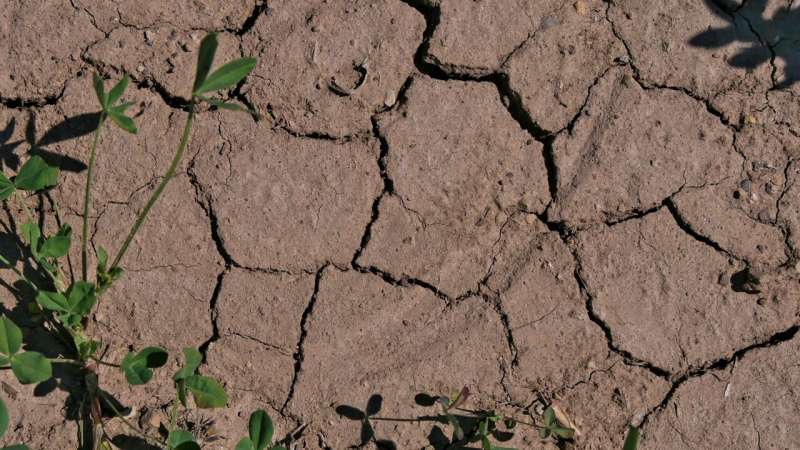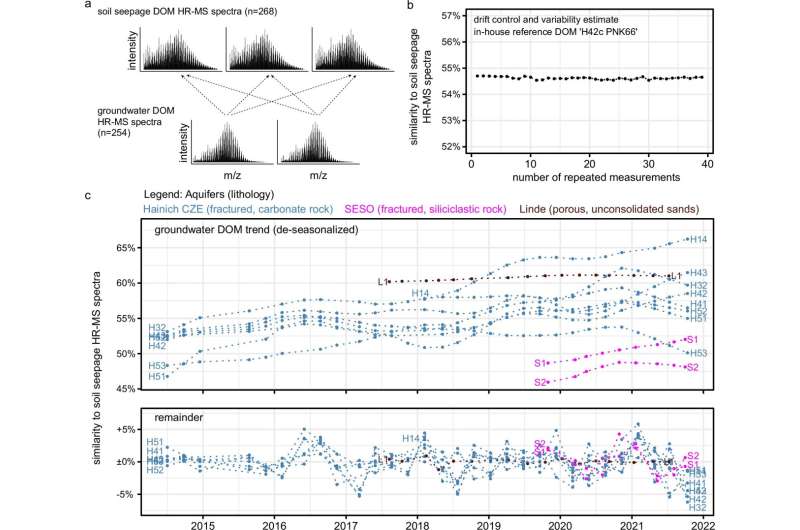This article has been reviewed according to Science X's editorial process and policies. Editors have highlighted the following attributes while ensuring the content's credibility:
fact-checked
peer-reviewed publication
trusted source
proofread
Groundwater threatened by droughts and heavy rainfalls, long-term analyses find

Extreme climate events endanger groundwater quality and stability when rain water evades natural purification processes in the soil. This was demonstrated in long-term groundwater analyses using new analytical methods, as described in a recent study in Nature Communications. As billions of people rely on sufficient and clean groundwater for drinking, understanding the impacts of climate extremes on future water security is crucial.
Groundwater-containing rock formations, termed aquifers, are commonly recharged through precipitation seeping through the soil. During this passage, substances taken up at the surface are removed from the water via sorption to soil minerals or they are metabolized by soil microorganisms. This natural filtering process results in highly purified groundwater resources.
However, rainfall can sometimes quickly flow into deeper soil layers thereby evading purification and transporting large amounts of dissolved substances from the surface and upper soil layers into groundwater aquifers.
This is particularly true following extreme rainfall and after drought periods. Extended droughts induce large cracks in the soil and they also reduce the uptake of rain water in upper soils. Under such conditions, water flows more directly into the groundwater, or alternatively runs off into rivers, lakes and oceans.
The groundwater is then not sufficiently replenished, but also contaminated with unwanted and potentially harmful substances from the surface and upper soil layers. These may include, e.g., organic matter, herbicides and pesticides, microbial products like antibiotics, as well as any other pollutants.
In a novel experimental approach Simon A. Schroeter and Gerd Gleixner from Max Planck Institute for Biogeochemistry performed long-term groundwater analyses in Germany, together with a large research team. They used detection of dissolved organic matter as a proxy for water contaminants and confirmed fundamental changes in groundwater stability.

"Our results suggest that climate change-induced extreme weather events are already altering groundwater quality and its recharge dynamics," says postdoctoral researcher Schroeter.
The research team studied groundwater and the corresponding hydroclimatic conditions in three geologically distinct research sites in Germany between 2014 and 2021. They analyzed water quality by tracking thousands of individual molecular entities on their passage from soil into groundwater. In contrast to standard methods, i.e. targeting the bulk concentration of dissolved organic carbon, their newly developed untargeted approach allowed them to detect any changes in the amount and chemical composition of organic molecules.
During up to 8 years of analysis, the scientists found consistent long-term trends: Increasing amounts of surface-derived organic substances accumulating in groundwater, as well as decreasing groundwater levels. In addition, they were able to clearly correlate such increased groundwater contamination with extreme weather events, in particular with the drought in 2018.
Their results suggest that the new method is significantly more sensitive to detect changes in groundwater quality than the commonly employed carbon measurement. It could therefore serve as a future early indicator of groundwater quality deterioration. While the method relies on organic molecules as indicators of water contamination, the actual contaminants may include any pollutants washed out from the surface.
As climate change continues to intensify, scientists call for increased attention to groundwater management and mitigation strategies towards impacts of hydroclimatic extremes. The decline in the soil's natural water purification processes amplifies the stress our society already faces due to diminishing groundwater levels. Recent investigations warn that the climate-induced decrease in groundwater quality may exceed that of anthropogenic pollution.
Gleixner, head of the research group, adds, "Our method will help us to identify risks for groundwater quality in aquifers that are thought to be clean and safe to use for the future. Our research results underscore the urgent need for sustainable water management practices to protect this vital resource."
The study is part of the German Collaborative Research Center AquaDiva, led by Kirsten Küsel, Susan Trumbore, and Kai Totsche, an interdisciplinary initiative focusing on understanding the interactions between surface and subsurface ecosystems and their response to environmental changes. By integrating expertise from biogeochemistry, hydrogeology, and microbiology, AquaDiva aims to uncover the complex processes that govern groundwater ecosystems and their resilience to climate change.
More information: Simon A. Schroeter et al, Hydroclimatic extremes threaten groundwater quality and stability, Nature Communications (2025). DOI: 10.1038/s41467-025-55890-2
Journal information: Nature Communications
Provided by Max Planck Society



















